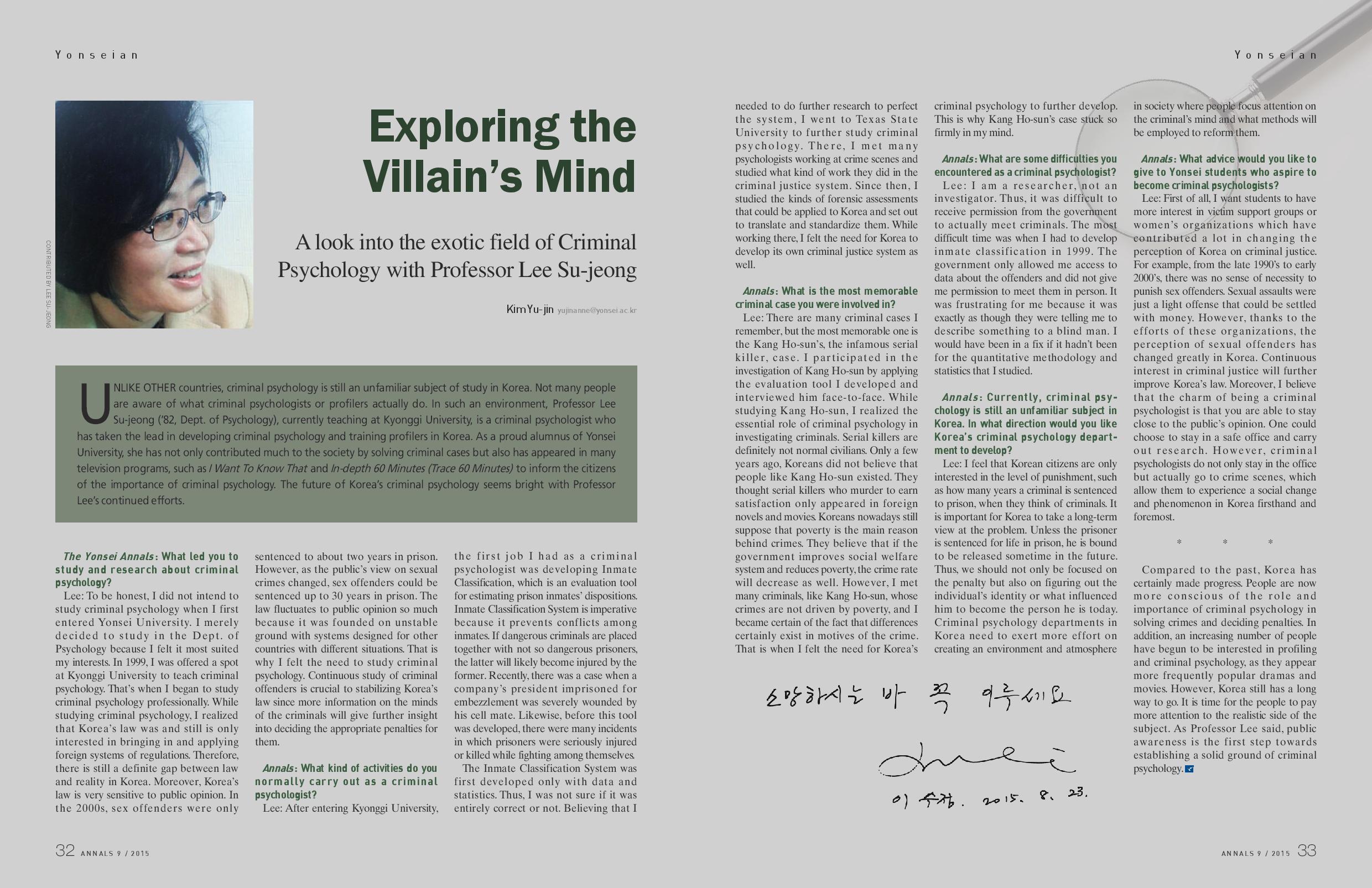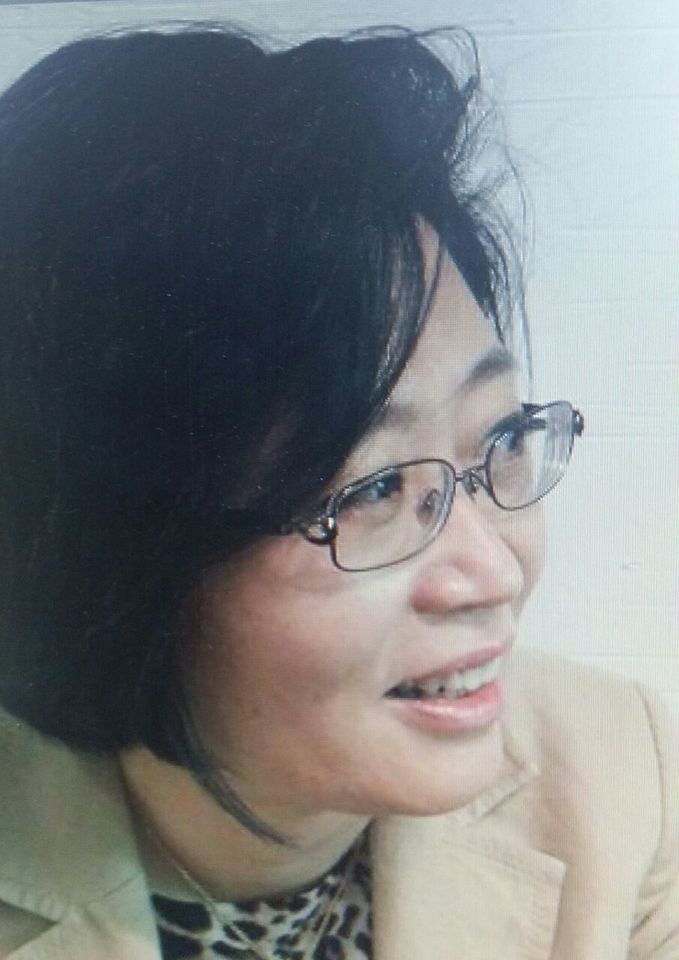A look into the exotic field of Criminal Psychology with Professor Lee Su-jeong


UNLIKE OTHER countries, criminal psychology is still an unfamiliar subject of study in Korea. Not many people are aware of what criminal psychologists or profilers actually do. In such an environment, Professor Lee Su-jeong (’82, Dept. of Psychology), currently teaching at Kyonggi University, is a criminal psychologist who has taken the lead in developing criminal psychology and training profilers in Korea. As a proud alumnus of Yonsei University, she has not only contributed much to the society by solving criminal cases but also has appeared in many television programs, such as I Want To Know That and In-depth 60 Minutes (Trace 60 Minutes) to inform the citizens of the importance of criminal psychology. The future of Korea’s criminal psychology seems bright with Professor Lee’s continued efforts.
The Yonsei Annals: What led you to study and research about criminal psychology?
Lee: To be honest, I did not intend to study criminal psychology when I first entered Yonsei University. I merely decided to study in the Dept. of Psychology because I felt it most suited my interests. In 1999, I was offered a spot at Kyonggi University to teach criminal psychology. That’s when I began to study criminal psychology professionally. While studying criminal psychology, I realized that Korea’s law was and still is only interested in bringing in and applying foreign systems of regulations. Therefore, there is still a definite gap between law and reality in Korea. Moreover, Korea’s law is very sensitive to public opinion. In the 2000s, sex offenders were only sentenced to about two years in prison. However, as the public’s view on sexual crimes changed, sex offenders could be sentenced up to 30 years in prison. The law fluctuates to public opinion so much because it was founded on unstable ground with systems designed for other countries with different situations. That is why I felt the need to study criminal psychology. Continuous study of criminal offenders is crucial to stabilizing Korea’s law since more information on the minds of the criminals will give further insight into deciding the appropriate penalties for them.
Annals: What kind of activities do you normally carry out as a criminal psychologist?
Lee: After entering Kyonggi University, the first job I had as a criminal psychologist was developing Inmate Classification, which is an evaluation tool for estimating prison inmates’ dispositions.Inmate Classification System is imperative because it prevents conflicts among inmates. If dangerous criminals are placed together with not so dangerous prisoners, the latter will likely become injured by the former. Recently, there was a case when a company’s president imprisoned for embezzlement was severely wounded by his cell mate. Likewise, before this tool was developed, there were many incidents in whichprisoners were seriously injured or killed while fighting among themselves.
The Inmate Classification System was first developed only with data and statistics. Thus, I was not sure if it was entirely correct or not. Believing that I needed to do further research to perfect the system, I went to Texas State University to further study criminal psychology. There, I met many psychologists working at crime scenes and studied what kind of work they did in the criminal justice system. Since then, I studied the kinds of forensic assessments that could be applied to Korea and set out to translate and standardize them. While working there, I felt the need for Korea to develop its own criminal justice system as well.
Annals: What is the most memorable criminal case you were involved in?
Lee: There are many criminal cases I remember, but the most memorable one is the Kang Ho-sun’s, the infamous serial killer, case. I participated in the investigation of Kang Ho-sun by applying the evaluation tool I developed and interviewed him face-to-face. While studying Kang Ho-sun, I realized the essential role of criminal psychology in investigating criminals. Serial killers are definitely not normal civilians. Only a few years ago, Koreans did not believe that people like Kang Ho-sun existed. They thought serial killers who murder to earn satisfaction only appeared in foreign novels and movies. Koreans nowadays still suppose that poverty is the main reason behind crimes. They believe that if the government improves social welfare system and reduces poverty, the crime rate will decrease as well. However, I met many criminals, like Kang Ho-sun, whose crimes are not driven by poverty, and I became certain of the fact that differences certainly exist in motives of the crime. That is when I felt the need for Korea’s criminal psychology to further develop. This is why Kang Ho-sun’s case stuck so firmly in my mind.
Annals: What are some difficulties you encountered as a criminal psychologist?
Lee: I am a researcher, not an investigator. Thus, it was difficult to receive permission from the government to actually meet criminals. The most difficult time was when I had to develop inmate classification in 1999. The government only allowed me access to data about the offenders and did not give me permission to meet them in person. It was frustrating for me because it was exactly as though they were telling me to describe something to a blind man. I would have been in a fix if it hadn’t been for the quantitative methodology and statistics that I studied.
Annals: Currently, criminal psychology is still an unfamiliar subject in Korea. In what direction would you like Korea’s criminal psychology department to develop?
Lee: I feel that Korean citizens are only interested in the level of punishment, such as how many years a criminal is sentenced to prison, when they think of criminals. It is important for Korea to take a long-term view at the problem. Unless the prisoner is sentenced for life in prison, he is bound to be released sometime in the future. Thus, we should not only be focused on the penalty but also on figuring out the individual’s identity or what influenced him to become the person he is today. Criminal psychology departments in Korea need to exert more effort on creating an environment and atmosphere in society where people focus attention on the criminal’s mind and what methods will be employed to reform them.
Annals: What advice would you like to give to Yonsei students who aspire to become criminal psychologists?
Lee: First of all, I want students to have more interest in victim support groups or women’s organizations which have contributed a lot in changing the perception of Korea on criminal justice. For example, from the late 1990’s to early 2000’s, there was no sense of necessity to punish sex offenders. Sexual assaults were just a light offense that could be settled with money. However, thanks to the efforts of these organizations, theperception of sexual offenders has changed greatly in Korea. Continuous interest in criminal justice will further improve Korea’s law. Moreover, I believe that the charm of being a criminal psychologist is that you are able to stay close to the public’s opinion. One could choose to stay in a safe office and carry out research. However, criminal psychologists do not only stay in the office but actually go to crime scenes, which allow them to experience a social change and phenomenon in Korea firsthand and foremost.
* * *
Compared to the past, Korea has certainly made progress. People are now more conscious of the role and importance of criminal psychology in solving crimes and deciding penalties. In addition, an increasing number of people have begun to be interested in profiling and criminal psychology, as they appear more frequently popular dramas and movies. However, Korea still has a long way to go. It is time for the people to pay more attention to the realistic side of the subject. As Professor Lee said, public awareness is the first step towards establishing asolid ground of criminal psychology.
Kim Yu-jin
yujinanne@yonsei.ac.kr

